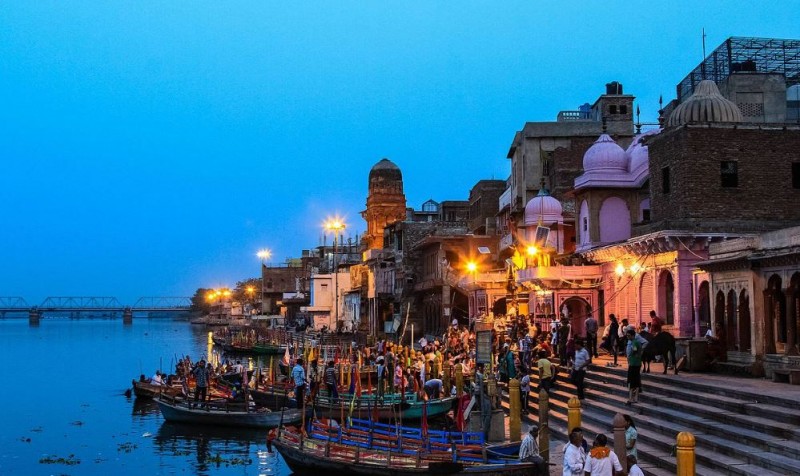
Mathura: Nestled along the banks of the revered Yamuna River, the historical city of Mathura has been a cradle of Indian civilization and spirituality for centuries. Its sacred significance is deeply intertwined with Hindu mythology, making it a focal point of devotion and cultural heritage. Let's embark on a journey through the annals of time to explore the rich history of Mathura, including the unfortunate demolition of its temples as depicted in Hindu religious texts.
Ancient Roots and Mythological Significance
Mathura's origins can be traced back to ancient times, as mentioned in Hindu religious texts and epics. It is believed to be the birthplace of Lord Krishna, an incarnation of Lord Vishnu. The city's association with the divine life and exploits of Krishna lends it unparalleled spiritual importance. As described in the Bhagavata Purana and other scriptures, Mathura witnessed Krishna's birth, his miraculous childhood, and his battles against evil forces.
Archaeological Heritage and Historical Evidences
The archaeological treasures of Mathura reveal a rich tapestry of civilizations that have flourished on its sacred soil. The city's history dates back to the Mauryan period, and it prospered under the patronage of various dynasties, including the Kushans and Guptas. The archaeological site of Kankali Tila provides insights into Mathura's ancient urban planning, adorned with sculptures and structures from different eras.
Religious Pilgrimage and Temples
Mathura has been a beacon of spiritual pilgrimage for devout Hindus seeking to connect with the divine. The city boasts a multitude of revered temples, each holding its own historical and mythological significance. The Dwarkadhish Temple, Vishram Ghat, and Krishna Janmabhoomi are among the sacred sites that draw pilgrims from across the country.
Demolition of Temples: Dark Chapter in History
The tragic chapter in Mathura's history unfolds during the reign of Emperor Aurangzeb, whose policies led to the destruction of numerous Hindu temples, including those in Mathura. One of the most heart-wrenching episodes occurred in 1669 when the grand Kesava Deo Temple was targeted. According to historical accounts, the temple was razed to the ground on the orders of Aurangzeb, marking a grave violation of religious tolerance and cultural heritage.
Hindu Religious Texts
Hindu religious texts and scriptures vividly describe the events surrounding the demolition of temples in Mathura. These accounts serve as a somber reminder of the challenges faced by Hindu communities during a tumultuous period. The texts emphasize the significance of these temples in Hindu religious practice and lament the desecration and destruction wrought upon them.
Legacy of Resilience and Restoration
Despite the devastation caused by the demolition, Mathura's spirit remained unbroken. In subsequent centuries, efforts were made to rebuild and revive the city's sacred heritage. Devotees and rulers alike embarked on a mission to restore the sanctity of Mathura's temples, ensuring that the flames of devotion continued to burn brightly.
Contemporary Significance and Devotion
Today, Mathura stands as a testament to the enduring power of faith and the resilience of a community determined to preserve its cultural heritage. The city continues to be a vibrant center of pilgrimage, drawing devotees from all corners of the world. The legacy of Mathura's past, including the painful chapter of temple demolitions, serves as a poignant reminder of the importance of safeguarding religious freedom and cultural diversity.
In conclusion, Mathura's history is a reflection of India's rich cultural tapestry, shaped by myth, devotion, and resilience. The demolition of its temples, as narrated in Hindu religious texts, underscores the need to cherish and protect our heritage for future generations. As Mathura continues to thrive as a hub of spiritual fervor, it carries within its heart the stories of the past and the aspirations of a nation united in its reverence for the divine.
Destruction of the Vishwanath Temple in Banaras: A Dark Chapter in History
Aurangzeb's Reign: Unveiling the Historical Horrors
Veer Savarkar: Unveiling the Trailblazer of India's Freedom Journey